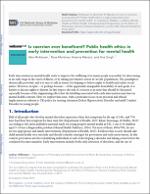Chapter Is coercion ever beneficent?
Public health ethics in early intervention and prevention for mental health
| dc.contributor.author | McKeown, Alex | |
| dc.contributor.author | Mortimer, Rose | |
| dc.contributor.author | Manzini, Arianna | |
| dc.contributor.author | Singh, Ilina | |
| dc.date.accessioned | 2021-04-26T09:41:22Z | |
| dc.date.available | 2021-04-26T09:41:22Z | |
| dc.date.issued | 2019 | |
| dc.identifier.uri | https://library.oapen.org/handle/20.500.12657/48381 | |
| dc.description.abstract | Early intervention in mental health seeks to improve the wellbeing of as many people as possible, by intervening at an early stage in the onset of illness, or by taking preventative action in ‘at risk’ populations. The paradigm is rhetorically powerful, and it is easy to talk in terms of it helping to deliver rights to health and realise social justice. However, in spite – or perhaps because – of the apparently unarguable desirability of such goals, it is harder to discuss rights to dissent. In this respect the risk of coercion is an issue that should be discussed, especially because of the stigmatizing effect that the labelling associated with early intervention may have in mental health contexts. Here we explore this issue, with a particular focus on its practical and ethical implications in relation to UK policy for treating Attention Deficit Hyperactivity Disorder and mild Conduct Disorder in young people. | en_US |
| dc.language | English | en_US |
| dc.subject.classification | thema EDItEUR::M Medicine and Nursing::MB Medicine: general issues::MBP Health systems and services::MBPK Mental health services | en_US |
| dc.subject.other | mental health; public health; ethics | en_US |
| dc.title | Chapter Is coercion ever beneficent? | en_US |
| dc.title.alternative | Public health ethics in early intervention and prevention for mental health | en_US |
| dc.type | chapter | |
| oapen.relation.isPublishedBy | bc3c4ca1-cc2d-4060-aa92-79940123861b | en_US |
| oapen.relation.isPartOfBook | 4892babc-b1a9-466d-84e4-2db67386b87e | en_US |
| oapen.relation.isFundedBy | d859fbd3-d884-4090-a0ec-baf821c9abfd | en_US |
| oapen.collection | Wellcome | en_US |
| oapen.pages | 17 | en_US |

